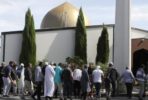Amid international accusations that the Myanmar military is leading a crackdown against the Rohingya Muslim minority in Rakhine, Myanmar State Counsellor Aung San Suu Kyi said she wants to make the situation better.
Asked if the problem is intractable, she said no. “We have managed to keep the situation under control and to calm it down,” she stated.
“But I would appreciate it so much if the international community would help us to maintain peace and stability and to make progress in building better relations between the two communities instead of always drumming up calls for, well, for bigger fires of resentment, if you like.”
Speaking in an exclusive interview with Channel NewsAsia’s Lin Xueling on Friday (Dec 2) during her official visit to Singapore, the Nobel Peace Prize laureate called for understanding from the international community and explained that the issue is a highly sensitive and delicate one.
“It’s not just Muslims who are nervous and worried. The Rakhine are worried too, they are worried about the fact that they are shrinking as a Rakhine population percentage-wise, and of course, we cannot ignore the fact that the relationship between the two communities has not been good and we want to try to make it better.
“But it doesn’t help if everybody is just concentrating on the negative side of the situation in spite of the fact that there were attacks against police outposts which began on Oct 9.”
The attacks were blamed on “terrorists” although the government had previously pointed at the Rohingya Solidarity Organisation, and since then, troops have poured into an area along the border with Bangladesh, which is largely home to the Rohingya minority.
Thousands have fled their homes as security forces hunt down more suspects who may be in hiding. Myanmar’s army has denied reports from activists that civilians have been killed, gang raped or had their homes torched.
When it was put to her that it is not solely the international community that is the root of the problem, Ms Suu Kyi said: “I know that. I’m not saying there are no difficulties, but it helps if people recognise the difficulty and are more focused on resolving these difficulties rather than exaggerating them so that everything seems worse than it really is.”
ASSESSMENT OF HER ADMINISTRATION
One result that Myanmar’s de-facto leader is satisfied with is “the fact that the ministers are not corrupt”, Ms Suu Kyi said when asked about what she is most pleased with in the nine months since her administration took over. She noted, however, that “some of the junior officers are still not quite what we would wish them to be”.
Ms Suu Kyi expressed hope that things can be improved, as she drew inspiration from Singapore’s example: “When I went to meet your corruption investigation bureau, they gave me a piece of paper, on which one of the things they said was that corruption is a fact of life, not a way of life. I like that very much, because this is how it is in our country. People accept it not as a way of life, although they recognise that is the fact of life, which means that the practice of corruption has not become embedded in our culture and that is very encouraging.”
On Myanmar’s journey from half a century of military rule to a democratically-elected civilian-led government, Ms Suu Kyi, despite being one of the world’s most prominent democracy icons, made it clear it is not driven by her alone.
“I have to keep reminding people that I was under house arrest for 15 years and they’ve (the military) only managed to retain public support during that period, and we managed to keep our party going in spite of the great difficulty. So, you must not underestimate the ability of many, many ordinary members of our political party, and our members are really the public, and we are very close to the public.”
She is optimistic that Myanmar, and whoever succeeds her, will be able to stay on the path of democracy. “How successful I am, as a leader, will be decided by how dispensable I can make myself, and I hope that I’ll be able to make myself totally dispensable, that they will not need me to go on, neither my party, nor my country.”
Source: ChannelNewsAsia







